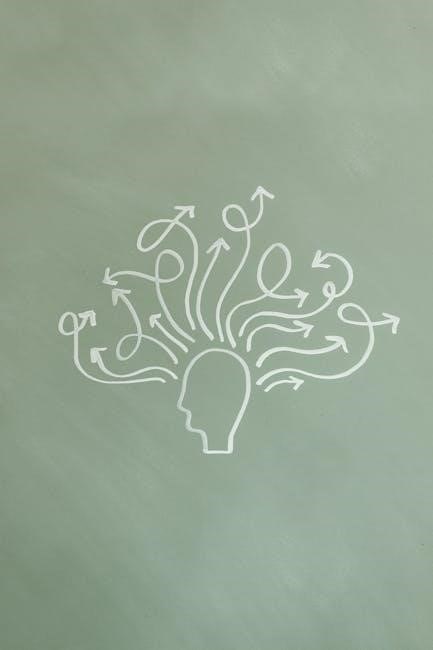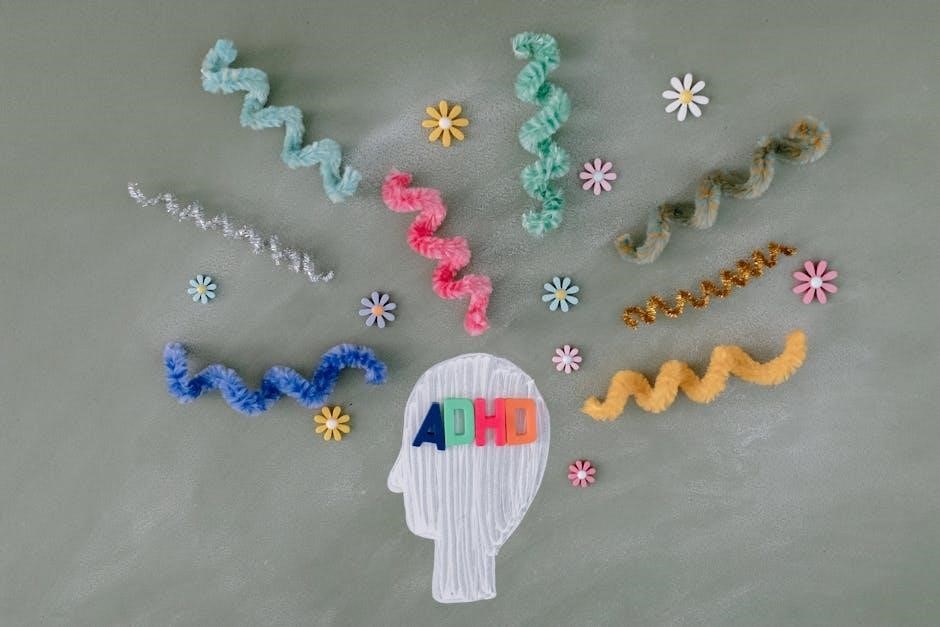Overview of “Myers Psychology for the AP Course 3rd Edition”
The 3rd edition, authored by David G. Myers and C. Nathan DeWall, aligns with the AP Psychology curriculum, offering updated content, enhanced digital features, and comprehensive coverage.

Myers Psychology for the AP Course, 3rd Edition, authored by David G. Myers and C. Nathan DeWall, is a comprehensive resource tailored for the AP Psychology curriculum. Designed to align with the College Board’s course framework, this textbook provides a thorough exploration of psychological concepts, theories, and research methods. It introduces students to the scientific study of behavior and mental processes, emphasizing critical thinking and real-world applications. The updated edition incorporates new content, enhanced digital features, and revised teaching resources, making it an essential tool for both students and educators preparing for the AP exam.
Authors: David G. Myers and C. Nathan DeWall
David G. Myers, a renowned psychology author, and C. Nathan DeWall, a respected researcher, collaborated on the 3rd Edition of Myers Psychology for the AP Course. Myers, known for his engaging writing style, has authored numerous psychology textbooks, while DeWall brings expertise in social psychology and neuroscience. Their partnership ensures a well-rounded and up-to-date perspective on psychological concepts. The textbook, published in 2018, is structured to align with the College Board’s AP Psychology framework, offering a comprehensive and accessible resource for students. Their combined expertise makes the book a trusted guide for understanding psychology’s core principles and applications.
Key Features of the 3rd Edition
The 3rd Edition of Myers Psychology for the AP Course features updated content aligned with the AP Psychology curriculum framework, ensuring relevance and comprehensiveness. It includes enhanced digital resources, such as interactive modules and study tools, to support student learning. The textbook is organized into nine units, reflecting the latest course structure, and incorporates real-world applications to make psychological concepts engaging. Additionally, the edition includes revised teaching resources for educators, making it a valuable tool for both students and instructors. These updates aim to provide a robust foundation for understanding psychology and preparing for the AP exam.
Alignment with AP Psychology Curriculum Framework
The 3rd Edition of Myers Psychology for the AP Course is explicitly aligned with the AP Psychology Curriculum Framework, ensuring a seamless integration of course content and exam preparation. It mirrors the framework’s nine-unit structure, covering topics from the history of psychology to emerging areas in the field. Each unit is carefully designed to address the learning objectives and key concepts outlined by the College Board. The textbook also incorporates practice questions and interactive resources to help students master the material. This alignment makes it an ideal resource for both teaching and studying AP Psychology, ensuring a comprehensive understanding of the subject matter.

Structure and Organization of the Book
The book is divided into nine logically organized units, covering psychology’s history, research methods, biological psychology, sensation, cognition, development, motivation, clinical, and social psychology.
Unit I: Psychology’s History and Approaches
Unit I explores the historical development of psychology, tracing its evolution from ancient philosophical roots to modern scientific practices. It introduces key figures like Wundt, James, Freud, and Skinner, highlighting their contributions. The unit also examines major psychological approaches, such as structuralism, behaviorism, psychoanalysis, and cognitive psychology, providing a foundational understanding of the field’s diversity. By discussing the scientific method and ethical considerations, it prepares students to critically evaluate psychological research. This unit is essential for building a strong base in psychology’s theories and methodologies, aligning with the AP curriculum’s emphasis on historical context and scientific inquiry.
Unit II: Research Methods in Psychology
Unit II delves into the scientific methods psychologists use to study behavior and mental processes. It covers experimental, correlational, and descriptive research designs, emphasizing the importance of ethical considerations. Students learn to critically evaluate studies, identify variables, and understand the differences between causation and correlation. The unit also explores research methodologies like surveys, case studies, and longitudinal studies. By mastering these concepts, students develop the ability to analyze and interpret psychological data, aligning with the AP curriculum’s focus on scientific inquiry and critical thinking. This foundation is crucial for understanding the empirical nature of psychology and preparing for the AP exam.

Unit III: Biological Psychology
Unit III explores the biological basis of behavior, focusing on the structure and function of the brain, nervous system, and sensory systems. It discusses neurotransmitters, hormones, and the role of genetics in shaping behavior. The unit also covers the immune system’s interaction with psychological processes and the effects of drugs on the brain. Students learn about techniques like fMRI and PET scans, which help researchers study the brain’s activity. This section emphasizes how biological processes influence cognition, emotion, and behavior, providing a foundational understanding of the biological underpinnings of psychology. It aligns with the AP curriculum’s focus on the biological perspective.
Unit IV: Sensation and Perception
Unit IV delves into the processes of sensation and perception, exploring how we detect and interpret stimuli. It covers the biology of sensory systems, including vision, hearing, touch, taste, and smell. The unit explains threshold levels, Weber’s law, and the difference between absolute and difference thresholds. Sensory adaptation and the role of context in perception are also discussed. Key concepts include perceptual set, Gestalt principles, and the influence of culture on perception. The section emphasizes the active role of the brain in organizing sensory information into meaningful experiences, linking these concepts to real-world applications and AP exam topics. This unit provides a foundation for understanding how we interact with and interpret our environment.
Unit V: Cognitive Psychology
Unit V explores the mental processes involved in cognition, including memory, language, problem-solving, and decision-making. It examines the different types of memory—sensory, short-term, and long-term—and strategies to enhance memory retention. The unit also delves into language development, cognitive biases, and heuristics, highlighting how these influence thinking and judgment. Additionally, it covers theories of intelligence and creativity, emphasizing their practical applications. Real-world examples and research studies illustrate key concepts, preparing students for exam topics while fostering critical thinking about cognitive processes and their everyday impact. This unit underscores the dynamic nature of cognition in shaping behavior and understanding human thought processes.
Unit VI: Developmental Psychology
Unit VI examines human development across the lifespan, focusing on cognitive, social, and emotional growth. It explores theories of development, including Piaget’s stages and Erikson’s psychosocial stages, while addressing contemporary research. Topics include infant development, language acquisition, adolescent identity formation, and aging. The unit emphasizes the interaction between nature and nurture, highlighting how biological, environmental, and cultural factors shape development. Real-world applications and case studies illustrate key concepts, preparing students to analyze developmental processes critically. This unit provides a comprehensive understanding of human development, equipping students with knowledge essential for the AP Psychology exam and beyond.
Unit VII: Motivation, Emotion, and Personality
Unit VII delves into the psychological drivers of human behavior, exploring motivation, emotion, and personality. It examines theories of motivation, such as Maslow’s hierarchy and self-determination theory, and discusses the biological and cognitive bases of emotions. The unit also covers personality theories, including the Big Five traits and Freudian psychoanalysis. Real-world applications and case studies illustrate how these concepts influence behavior and decision-making. By integrating cutting-edge research and practical examples, this unit provides students with a deep understanding of what drives individuals and shapes their unique identities, preparing them for related AP exam questions and fostering critical thinking about human behavior.
Unit VIII: Clinical Psychology
Unit VIII focuses on the study of mental disorders, their diagnosis, and treatment. It explores the classification of psychological disorders using the DSM-5, emphasizing the biological, psychological, and social factors contributing to mental health issues. The unit covers various therapeutic approaches, including psychotherapy, cognitive-behavioral therapy, and biomedical treatments like medication. Case studies and research findings illustrate the complexities of mental health and the importance of evidence-based interventions. This section prepares students to understand the principles of clinical psychology, its ethical considerations, and the role of psychologists in promoting mental well-being. It aligns with AP exam topics, ensuring a thorough grasp of clinical psychology concepts and applications.
Unit IX: Social Psychology
Unit IX explores how individuals think about, influence, and relate to others. It covers social thinking, persuasion, conformity, obedience, and group dynamics. Key topics include attribution theory, attitudes, cognitive dissonance, and the influence of social norms. The unit also examines interpersonal relationships, prejudice, aggression, and altruism, highlighting the practical applications of social psychology in real-world contexts. Case studies and research examples illustrate the complexities of human social behavior. This section aligns with AP exam topics, providing students with a deep understanding of social psychology principles and their relevance to everyday interactions and societal challenges.

Key Updates in the 3rd Edition
The 3rd edition includes new content additions, revised teaching and learning resources, and enhanced digital features to align with the updated AP Psychology curriculum framework.
New Content Additions
The 3rd edition introduces new content additions, including updated research findings, expanded coverage of diverse topics, and integration of recent psychological studies to reflect current trends in the field. These additions ensure students are exposed to the latest developments in psychology, making the material more engaging and relevant. The textbook now incorporates more real-world applications, helping students connect theoretical concepts with practical scenarios. Additionally, new modules and chapters have been added to address emerging areas within psychology, providing a comprehensive and modern perspective for AP students. This updated content aligns closely with the AP Psychology curriculum framework, enhancing student preparedness for exams and beyond.
Revised Teaching and Learning Resources
The 3rd edition features revised teaching and learning resources, including updated study guides, interactive online tools, and enhanced instructor materials. These resources are designed to improve student engagement and understanding, aligning with the updated AP Psychology curriculum framework. The textbook now offers more interactive digital content, such as quizzes, videos, and animations, to supplement traditional learning methods. Additionally, the revised instructor resources provide teachers with updated lesson plans, discussion prompts, and assessment materials, ensuring a cohesive and effective learning experience for both students and educators. These enhancements aim to foster a deeper grasp of psychological concepts and prepare students for success in their AP courses and exams.
Enhanced Digital Features
The 3rd edition of Myers Psychology for the AP Course includes enhanced digital features, such as interactive simulations, virtual labs, and multimedia content, all accessible online. These features allow students to engage with complex psychological concepts in a dynamic and immersive way. The digital platform also offers personalized study plans, adaptive quizzes, and real-time progress tracking, enabling students to identify areas where they need more practice. Additionally, the e-book version is optimized for mobile devices, making it easier for students to study on the go. These digital enhancements provide a modern and flexible learning experience, catering to diverse learning styles and preferences.

Popular Chapters and Topics
Chapters like Biological Psychology, Cognitive Psychology, and Social Psychology are particularly popular, offering deep insights into brain function, memory, and human behavior. These topics are essential for AP success.

Chapter 3: Biological Psychology
Chapter 3 delves into the biological basis of behavior, exploring the brain’s structure, nervous and endocrine systems, and the role of neurotransmitters. It also examines sensory and motor functions, emphasizing how biology shapes cognition and behavior. Evolutionary psychology is introduced, highlighting how natural selection influences human traits. The chapter provides a clear understanding of genetics and their impact on behavior, making complex concepts accessible. With detailed explanations and real-world applications, this chapter is indispensable for AP students, offering a foundational grasp of biological psychology that aligns with the AP curriculum and prepares students for exam success.
Chapter 5: Cognitive Psychology
Chapter 5 focuses on mental processes such as perception, memory, language, and problem-solving. It discusses how we process information, from sensory input to complex decision-making. Memory models, including the Atkinson-Shiffrin memory model, are explained, along with strategies to enhance memory retention. Language acquisition and cognitive development across the lifespan are also covered. The chapter emphasizes how cognition influences emotions and behaviors, providing practical examples to illustrate key concepts. With engaging content and real-world applications, this chapter helps AP students grasp cognitive psychology’s essential theories and research methods, aligning closely with the AP Psychology curriculum and exam requirements.
Chapter 9: Social Psychology
Chapter 9 delves into how social interactions shape behavior, attitudes, and beliefs. It explores key concepts like social influence, persuasion, group dynamics, and interpersonal attraction. The chapter discusses conformity, obedience, and the impact of social norms. It also examines altruism, aggression, and prejudice, providing insights into human behavior in social contexts. Real-world examples illustrate how social psychology applies to everyday life, from marketing to conflict resolution. The chapter aligns with the AP Psychology curriculum, emphasizing critical thinking about social phenomena. Engaging explanations and practical applications make this chapter a valuable resource for understanding the complexities of human social behavior and its psychological underpinnings.

Importance of the Textbook for AP Students
This textbook provides comprehensive coverage of AP Psychology topics, aligning with the curriculum framework. It offers engaging content, real-world applications, and preparation strategies, making it an essential study resource.
Comprehensive Coverage of AP Psychology Topics
The Myers Psychology for the AP Course 3rd Edition provides an extensive review of all topics within the AP Psychology curriculum. It covers the nine-unit structure, including units on biological psychology, sensation and perception, cognitive psychology, developmental psychology, motivation and emotion, personality, clinical psychology, and social psychology; Each chapter is designed to align with the College Board’s course framework, ensuring students gain a deep understanding of key concepts, theories, and research methods. The textbook incorporates updated content, real-world applications, and critical thinking exercises, making it an invaluable resource for students preparing for the AP Psychology exam.
Preparation for the AP Exam
The 3rd Edition of Myers Psychology for the AP Course is specifically designed to prepare students for success on the AP Psychology exam. It aligns with the College Board’s course framework and includes practice questions, review sections, and test-taking strategies. The textbook incorporates updated content and resources, such as chapter assessments and concept reviews, to help students gauge their understanding. Additionally, the authors provide real-world examples and critical thinking exercises to mirror the exam’s format. This comprehensive approach ensures students are well-equipped to tackle both the multiple-choice and free-response sections of the AP Psychology exam with confidence.
Engaging Writing Style and Real-World Applications
The 3rd Edition of Myers Psychology for the AP Course captivates students with its engaging narrative and relatable examples. Authors David G. Myers and C. Nathan DeWall use storytelling techniques and real-world scenarios to make complex psychological concepts accessible and interesting. Each chapter connects psychological theories to everyday life, helping students see the relevance of psychology in their own experiences. This approach fosters a deeper understanding and encourages critical thinking. The textbook also includes contemporary research and case studies, making it not only informative but also thought-provoking. This blend of style and substance ensures that students stay engaged while developing a strong foundation in AP Psychology.

Accessing the PDF Version
The PDF version of Myers Psychology for the AP Course 3rd Edition is available online for free download or reading, authored by David G. Myers and C. Nathan DeWall.

Availability of the PDF Online
The PDF version of Myers Psychology for the AP Course 3rd Edition is widely available online, accessible through platforms like Scribd, Google Drive, and educational forums. The file, totaling 76MB, is downloadable for free, offering a convenient resource for AP students. It is compatible with multiple devices, ensuring flexibility for studying. The PDF retains the book’s original structure, including all nine units and supplementary materials. However, users are advised to verify the legality of downloads, as distribution may vary by region. This digital format is a popular choice among students preparing for the AP Psychology exam due to its portability and ease of use.
Downloading and Reading Options
Students can download the PDF version of Myers Psychology for the AP Course 3rd Edition from various online sources, including educational forums and file-sharing platforms. The download process typically involves a few clicks, and the file is compatible with multiple devices. Once downloaded, the PDF can be read using standard PDF readers like Adobe Acrobat or online tools. Additionally, it can be accessed on e-readers or tablets, offering flexibility for study sessions. The file’s digital format allows for easy navigation, with features like bookmarks and search functions enhancing the learning experience. This accessibility makes it a valuable resource for AP Psychology students preparing for exams or assignments.
Legal Considerations for PDF Distribution
Distributing or sharing the PDF of Myers Psychology for the AP Course 3rd Edition without proper authorization may violate copyright laws. The textbook is protected by intellectual property rights, and unauthorized sharing can lead to legal consequences. It is important to respect the rights of authors and publishers by obtaining the PDF through legitimate channels, such as purchasing the book or accessing it through official educational platforms. Users are encouraged to avoid illegal downloads and instead support the creators by using authorized resources. This ensures compliance with legal standards and promotes ethical academic practices.
Myers Psychology for the AP Course 3rd Edition remains a vital resource for AP students, offering comprehensive coverage and updated content aligned with the curriculum framework. Its engaging style and real-world applications make it an invaluable tool for academic success. Students are encouraged to utilize this textbook ethically by purchasing it through official channels, ensuring they benefit fully from its wealth of knowledge while supporting its creators. This edition continues to set a high standard for AP Psychology preparation and learning.
Final Thoughts on the Textbook’s Value
Myers Psychology for the AP Course 3rd Edition is an indispensable resource for AP Psychology students, offering a well-structured and comprehensive approach to the subject. Its alignment with the College Board’s curriculum framework ensures that students are thoroughly prepared for the AP exam. The textbook’s engaging writing style, real-world applications, and updated content make complex psychological concepts accessible and interesting; The inclusion of enhanced digital features and revised teaching resources further supports both students and educators; By utilizing this textbook, students can gain a deep understanding of psychology, develop critical thinking skills, and perform confidently on the AP exam. Its value lies in its ability to balance academic rigor with practical relevance, making it a cornerstone of AP Psychology education. Ethical use of this resource is essential, and students are encouraged to access it through legitimate channels to fully benefit from its content while respecting copyright laws. Overall, the 3rd edition of Myers Psychology for the AP Course is a valuable investment for any student aiming to excel in AP Psychology.
Recommendations for AP Psychology Students
Students preparing for the AP Psychology exam are highly encouraged to utilize the Myers Psychology for the AP Course 3rd Edition as their primary study resource. This textbook provides a comprehensive review of all AP Psychology topics, ensuring thorough preparation for the exam. Its structured approach aligns perfectly with the College Board’s curriculum framework, making it an ideal choice for both in-class learning and independent study; The inclusion of updated content, real-world applications, and enhanced digital features makes it easier for students to grasp complex psychological concepts. Additionally, the textbook’s engaging writing style helps maintain student interest and motivation. By leveraging this resource, students can confidently master the material and achieve success on the AP Psychology exam. It is recommended that students access the textbook through legitimate channels to ensure they receive the most accurate and complete information while adhering to copyright laws. Regular review and active engagement with the content will maximize its benefits and contribute to overall academic success in the course. Overall, the Myers Psychology for the AP Course 3rd Edition is a valuable tool that plays a crucial role in helping students excel in their AP Psychology studies.

